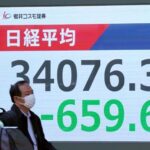Billionaire Elon Musk has sparked controversy once again by handing out $1 million checks to select voters, this time in Wisconsin, ahead of a state Supreme Court election.
The move follows similar actions during last year’s presidential campaign in Pennsylvania, raising questions about the legality of such financial incentives.
Musk, who is backing a conservative candidate in Wisconsin, has not faced legal repercussions for his actions, as neither state nor federal courts have intervened. Legal experts and election watchdogs are perplexed by how Musk has managed to sidestep campaign finance laws.
According to Musk’s lawyers, the recipients of these hefty checks are not chosen at random, but are instead being compensated as “spokespeople.” This legal framing, they argue, keeps the transactions within the bounds of election laws, despite appearing akin to a lottery giveaway.
The optics of the situation, however, are troubling to many. Social media is flooded with images of grinning recipients holding oversized checks, fueling debate over the ethical implications of a billionaire directly financially rewarding voters. Critics argue that even if technically legal, the practice undermines the integrity of the democratic process.
Campaign finance experts trace the roots of this phenomenon back to the landmark Citizens United ruling by the Supreme Court in 2010. The decision effectively allowed corporations and wealthy individuals to spend unlimited amounts on political campaigns, fundamentally altering the landscape of U.S. election financing.
Saurav Ghosh, director of campaign finance reform at the Campaign Legal Center, describes Musk’s actions as a logical outcome of the culture shaped by Citizens United. “What had once been a clear prohibition on corporate election spending was blown away overnight,” Ghosh explained.
Following Citizens United, another ruling by a federal appellate court in 2010 SpeechNow.org v. FEC allowed groups that only spend money independently to raise unlimited funds from corporations and individuals. This led to the rise of super PACs and so-called dark money groups, drastically increasing outside spending in elections.
Musk’s financial interventions reflect the growing influence of billionaires in American politics. Critics argue that his actions are part of a broader trend of wealthy individuals leveraging their resources to shape electoral outcomes, effectively drowning out the voices of average voters.
Despite the controversy, Musk remains undeterred, continuing to issue checks while navigating the legal gray areas his legal team has carved out. The lack of judicial intervention has only intensified debates over whether current laws are sufficient to protect the democratic process from the sway of billionaire donors.
As the Wisconsin Supreme Court election approaches, legal experts and political analysts are closely watching how Musk’s actions will influence the outcome — and whether new legal challenges might arise. For now, his financial maneuvers serve as a glaring example of the complex and evolving relationship between wealth and political power in America.
In the meantime, public outrage continues to build, with many questioning not just the legality but the morality of directly paying voters. The broader implications for future elections remain unclear as Musk pushes the boundaries of campaign finance norms.







